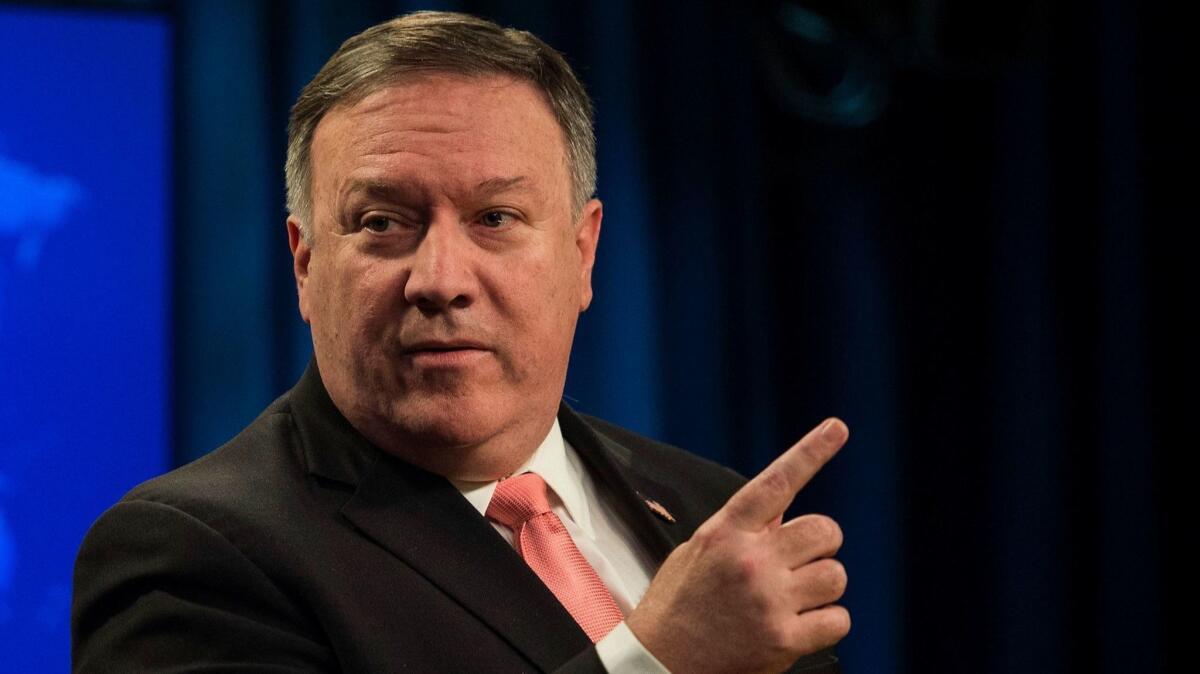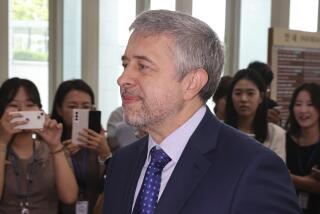Pompeo’s meeting with North Korean counterpart called off at last minute

Secretary of State Michael R. Pompeo’s planned meeting with his North Korean counterpart in New York this week has been called off at the last minute, the State Department announced Wednesday, without giving any explanation or new date.
South Korea’s government warned against reading too much into the postponement. Nevertheless, there have been signs of a growing rift between Washington and Pyongyang over the denuclearization process and the right time to lift sanctions.
The meeting was scheduled to take place Thursday, but State Department spokeswoman Heather Nauert said it would now take place “at a later date.”
“We will reconvene when our schedules permit,” she added in a statement. “Ongoing conversations continue to take place. The United States remains focused on fulfilling the commitments agreed to by President Trump and Chairman Kim [Jong Un] at the Singapore summit in June.”
South Korea’s national broadcaster KBS reported that the North Korean negotiating team, led by Kim Yong Chol, was supposed to get on a Wednesday flight from Beijing to New York.
But KBS said it was unclear if the team had even arrived in Beijing, and added that Kim Yong Chol had apparently canceled his New York flight early on Tuesday.
The postponement comes at a tricky time in the nuclear negotiations.
North Korea has said it wants both sides to take “simultaneous and phased” steps, with concessions from Pyongyang matched by concessions from Washington, to reassure Kim Jong Un that he can safely scale back or dismantle his nuclear weapons program.
The United States takes a fundamentally different approach, demanding North Korea fully denuclearize before sanctions are lifted.
In the past few weeks, the two sides appear to have grown further apart and North Korea has upped its demands, It had been asking the United States formally declare an end to the 1950-53 Korean War, but now it is arguing forcefully that it needs relief from sanctions before it takes any further steps.
On Friday, a commentary published by the head of a North Korean Foreign Ministry think tank warned that Pyongyang might even restart its nuclear weapons program if sanctions are not lifted.
At the same time, South Korean government advisors and experts say Pyongyang is not prepared to hand over a list of its nuclear and missile facilities, believing such a document would effectively give the U.S. a list of potential military targets.
If these disputes are behind the postponement of the meeting, it would not be the first time the negotiations have run into troubled waters.
In May, Trump announced that his planned summit with Kim had been canceled, citing a series of hostile and angry statements coming out of Pyongyang.
But soon afterward, thanks to mediation from South Korean President Moon Jae-in, Kim Yong Chol flew to the United States to meet Pompeo and personally deliver a letter to Trump that paved the way for the June summit.
In August, a planned trip by Pompeo to Pyongyang was also canceled when negotiations hit an impasse, with the secretary of State eventually making the trip last month.
Kim Eui-keum, a spokesman for South Korea’s presidential Blue House, advised against reading too much into the latest setback.
“This has happened in the past so we don’t need to overemphasize this,” he told reporters. “I also don’t think this means U.S.-North Korea talks, both at the high level and summit level, have lost their momentum.”
Many experts doubt Pyongyang’s willingness to surrender its nuclear weapons and believe it has been stringing Trump along to gain whatever concessions it can.
Joel Wit, a former State Department official with extensive experience of negotiating with the North Koreans, says the Washington is sticking to the “old playbook,” one that has failed repeatedly, particularly in its insistence that North Korea first take steps such as denuclearization before the United States does anything.
Wit, a senior fellow at the Henry L. Stimson center, has become much more pessimistic in recent weeks. “I think the U.S. is going to miss this opportunity essentially because there is no one below Trump [who] is capable of thinking out of the box,” he wrote in an email earlier this week.
The Washington Post’s Min Joo Kim in Seoul contributed to this report.
More to Read
Sign up for Essential California
The most important California stories and recommendations in your inbox every morning.
You may occasionally receive promotional content from the Los Angeles Times.










